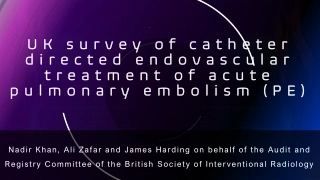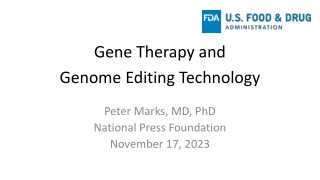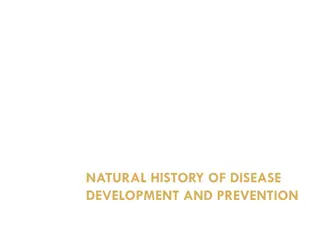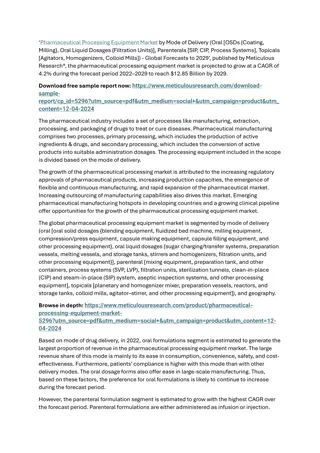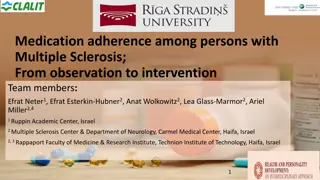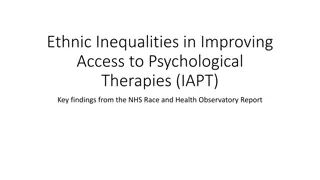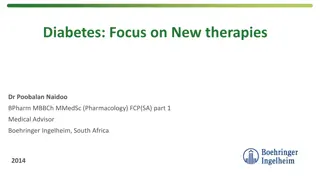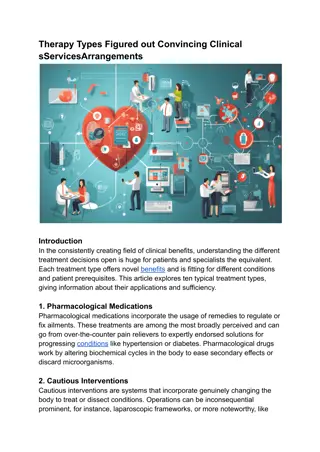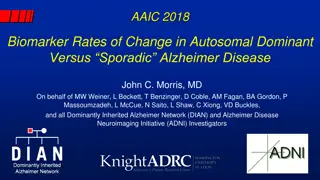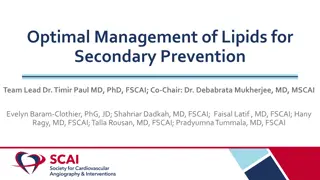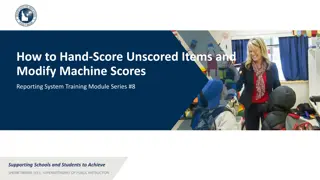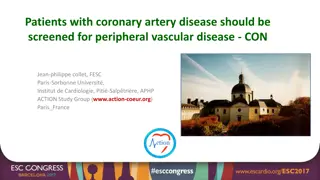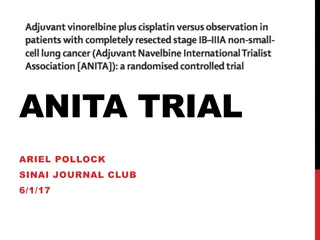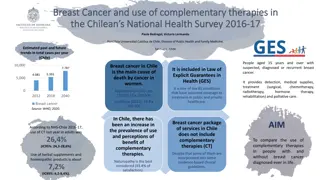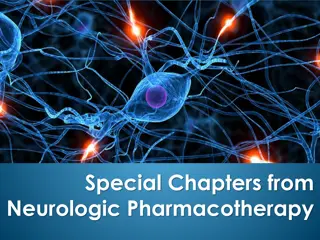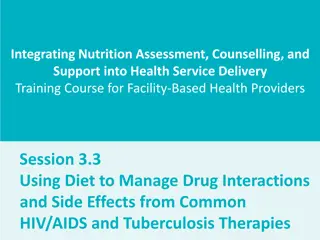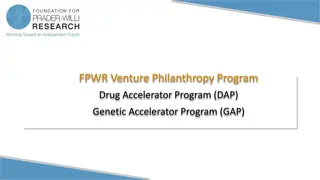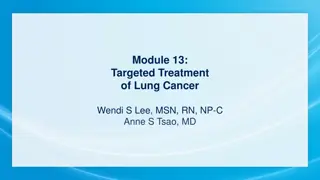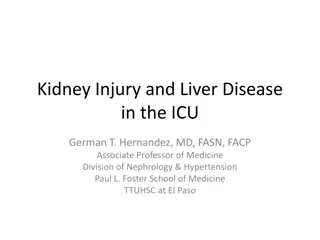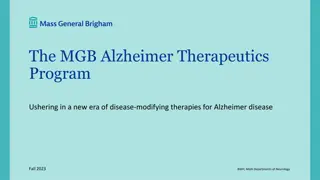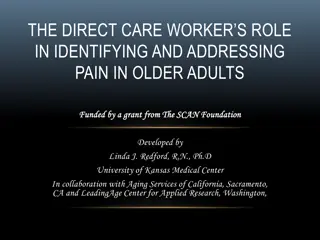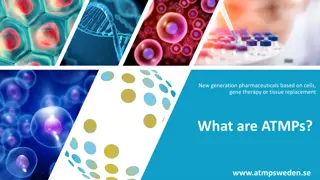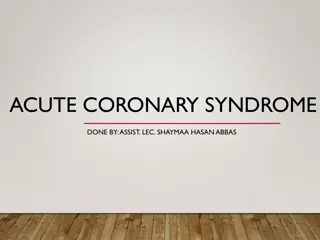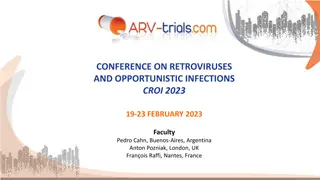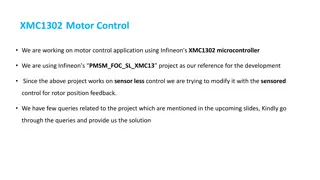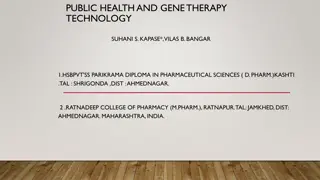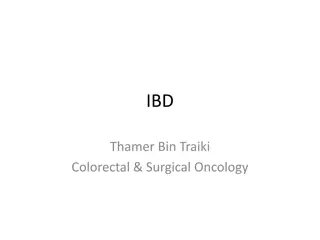UK Survey on Endovascular Treatment of Acute Pulmonary Embolism
Acute pulmonary embolism (PE) is a significant issue in hospitalized patients, with current treatments focusing on anticoagulation and systemic thrombolysis. Surgical treatments have shown poor outcomes, leading to a rise in endovascular techniques aimed at reducing clot burden. A survey conducted i
0 views • 12 slides
Gene Therapy and Genome Editing Technology
This article provides insights into the status, regulatory considerations, and delivery methods of gene therapy and genome editing technologies. It discusses approved gene therapies in the US, human genome editing in clinical applications, and the regulatory authority of the FDA over gene therapy. T
3 views • 27 slides
The Natural History of Disease Development and Prevention
The natural history of disease development outlines the progression of a disease in an individual without intervention, from exposure to outcome. Learning objectives include defining prevention terms, understanding disease severity, prevention levels, and intervention measures. Studying disease prog
4 views • 16 slides
Pharmaceutical Processing Equipment Market
Pharmaceutical processing includes a range of unit operations such as blending, milling, granulation, tablet pressing, coating, and filling, depending on the mode of delivery. With the growing adoption of continuous manufacturing and the rising number of novel therapies in clinical development, phar
2 views • 2 slides
Looking for the best Wellbeing in Cotham
Are you looking for the Best Wellbeing in Cotham? Then visit The Arches Therapy Rooms. Their therapy center boasts a diverse range of services delivered by a team of dedicated professionals, including counseling, holistic therapy, hypnotherapy, acupuncture, and massages. Located in Montpelier, they
0 views • 6 slides
Enhancing Medication Adherence in Multiple Sclerosis Patients
This study explores medication adherence among individuals with Multiple Sclerosis (MS), presenting insights from observation to intervention stages. It delves into the background of MS, adherence, Disease-Modifying Therapies (DMTs), and the challenges faced. The team identifies reasons for non-adhe
0 views • 41 slides
Trafford Talking Therapies: Mental Health Support for Perinatal Clients
Trafford Talking Therapies is a primary care service offering evidence-based treatments for adults experiencing anxiety and depression. They prioritize perinatal clients from conception to 2 years postpartum, recognizing the importance of parental mental health. The service covers a range of present
0 views • 7 slides
Trafford Talking Therapies: Perinatal Mental Health Support
Providing evidence-based treatments for adults with anxiety and depression, Trafford Talking Therapies prioritizes perinatal clients from conception to 2 years, emphasizing the importance of the parent-infant relationship. They offer support for various mental health issues and deliver cognitive-beh
0 views • 7 slides
Addressing Ethnic Inequalities in Access to Psychological Therapies: Insights from NHS Race and Health Observatory Report
NHS England's efforts to advance equality in healthcare services recognize the disparities faced by minoritised ethnic groups, particularly in accessing psychological therapies. Recent findings indicate that individuals from these groups experience worse outcomes, longer wait times for assessment an
0 views • 5 slides
Embracing the Limitless Potential of Image-Guided Therapies in Interventional Radiology
Harnessing the power of image-guided therapies, the Society of Interventional Radiology (SIR) believes in pushing the boundaries of medical possibilities to improve patient outcomes, physician insights, and clinical practices. Through research-based outcomes and storytelling, SIR advocates for great
0 views • 46 slides
New Therapies for Diabetes: A Focus on Prevention and Treatment
Explore the impact of diabetes worldwide and in South Africa, with a particular focus on the epidemiology, consequences, and current therapies for Type 2 diabetes. Dr. Poobalan Naidoo discusses the increasing prevalence of diabetes and the urgent need for new therapeutic approaches to combat this gr
0 views • 35 slides
Therapy Types Figured out Convincing Clinical services Arrangements
Understanding the variety of accessible medical care therapies is fundamental for coming to informed conclusions about your well-being. This article dives into ten normal therapy types, including pharmacological therapies, careful mediation, exercise
0 views • 4 slides
Biomarker Rates of Change in Autosomal Dominant vs. Sporadic Alzheimer Disease
Autosomal Dominant Alzheimer Disease (ADAD) and Sporadic Late Onset Alzheimer Disease (LOAD) show distinct clinical presentations, neuropathological features, and rates of progression. The DIAN-ADNI Comparison Study aims to investigate if ADAD and LOAD share the same pathophysiology and how they res
0 views • 16 slides
Optimal Management of Lipids for Secondary Prevention Team Study
Lipid management in secondary prevention plays a crucial role in reducing cardiovascular risk. This study led by Dr. Timir Paul aims to address system-level gaps in care, enhance communication for optimal therapy, and empower patients in achieving target lipid levels. By recognizing disparities and
0 views • 28 slides
Supporting Schools and Students: Hand-Scoring & Score Reporting Training Module
This training module series, led by Superintendent Sherri Ybarra, delves into the process of hand-scoring unscored items and modifying machine-generated scores to support schools and students in achieving academic success. It covers accessing tests requiring hand-scoring, utilizing scoring mode and
0 views • 8 slides
Screening for Peripheral Vascular Disease in Patients with Coronary Artery Disease
Patients with coronary artery disease should be screened for peripheral vascular disease as it is a frequent integrator of global cardiovascular risk. The association of atherosclerosis in various arterial diseases highlights the importance of identifying multisite artery disease. The prevalence and
0 views • 23 slides
Human Disease Symptom Network: Understanding Disease Relationships Through Symptoms and Genes
The Human Disease Symptom Network (HSDN) is constructed using a large-scale medical bibliographic records database to form a network of human diseases based on symptom similarities. By integrating disease-gene associations and protein-protein interaction data, correlations between symptom similarity
1 views • 37 slides
Adjuvant Therapies in Early Stage NSCLC: A Review
Examining the role of adjuvant therapies in stage IB-IIIA non-small cell lung cancer (NSCLC) post-surgery. Discussion includes the impact of chemotherapy and radiation therapy on overall survival rates and the historical context of adjuvant treatment decisions. Management strategies and consideratio
0 views • 30 slides
Trends in Complementary Therapies Use for Breast Cancer in Chile
Complementary therapies (CT) use, including natural medicine and homeopathy, is on the rise among individuals with and without a breast cancer diagnosis in Chile. While some CTs are not included in the official healthcare package, there is increasing interest in incorporating them due to high satisf
0 views • 4 slides
Optimizing Foundational Treatments for HFrEF: Guideline Recommendations and Implementation Strategies
Highlighting the current guideline recommendations for treating patients with Heart Failure with Reduced Ejection Fraction (HFrEF), this educational slide module emphasizes the importance of implementing the recommended therapies effectively. It covers the foundational treatments recommended by vari
0 views • 28 slides
Pharmacotherapy Overview of Parkinson's Disease and Related Disorders
Overview of pharmacological treatment options for Parkinson's disease and related conditions like choreatic dyskinesias, spastic disorders, and myasthenia gravis. Describes the degenerative process of Parkinson's disease, its symptoms, and the pharmacological interventions targeting dopamine deficit
0 views • 26 slides
Managing Drug Interactions and Side Effects in HIV/AIDS and Tuberculosis Therapies
Learn how to identify common therapies used in HIV/AIDS and TB treatment, understand drug-food interactions and side effects, and provide appropriate nutrition assessment and support to improve treatment outcomes. Service providers play a crucial role in addressing nutritional needs and managing dru
0 views • 34 slides
Foundation for Prader-Willi Research: Advancing Therapies for PWS
The Foundation for Prader-Willi Research (FPWR) is a leading organization dedicated to funding research and therapeutic development for Prader-Willi Syndrome (PWS), a complex genetic disorder. PWS poses challenges such as obesity and developmental delays. FPWR aims to accelerate the development of n
0 views • 15 slides
Simplifying Middlebox Modifications with NFV State Management
Paving the Way for NFV explores how Network Function Virtualization (NFV) simplifies middlebox modifications through state analysis and management. The process involves creating or updating state in middleboxes for various connections, utilizing frameworks for transferring live state, and addressing
0 views • 22 slides
Brainspotting and Power Therapies for Trauma Healing
Participants in this workshop will explore Brainspotting (BSP) and other Power Therapies, learning about trauma, its effects, and the power of therapies such as EMDR, TFT/EFT, HAKOMI, PBSP, and more in addressing trauma and promoting healing through heightened bodily awareness and somatic memory ret
0 views • 19 slides
Adjectives, Adverbs, and Linking Verbs in Writing
Learn about the significance of linking verbs in expressing a state of being, the role of adjectives in modifying nouns, and the function of adverbs in modifying verbs, adjectives, and adverbs. Explore examples of using "bad" and "badly," as well as "good" and "well" correctly. Test your understandi
0 views • 8 slides
Targeted Treatment Options for Lung Cancer Patients
Explore targeted treatment approaches for lung cancer through real-life patient cases, expert insights, and updates on therapies. Learn about personalized care, innovative options, and advancements in non-small cell lung cancer treatment. Delve into disclosures from healthcare professionals involved
0 views • 49 slides
Role of Lipids in Plant-Pathogen Interaction
Lipids play a central role in signal molecule production for actively modifying the invasive capabilities of pathogens and the defensive mechanisms of plants during inter and intra-plant-pathogen interactions. They are essential constituents of membranes, providing structural support and serving div
0 views • 43 slides
Kidney Injury and Liver Disease in the ICU
This presentation delves into the intricacies of acute kidney injury (AKI) and its occurrence in patients with liver disease in the intensive care unit (ICU). It covers the definitions, classifications, and causes of AKI, emphasizing the Hepatorenal Syndrome, a form of functional renal failure in en
0 views • 29 slides
Providing Reasonable Accommodations to Veterans
This resource, presented by James Potts, M.S., and Melanie Whetzel, M.A., CBIS, discusses the importance of providing reasonable accommodations to veterans with disabilities. It covers real-life situations and solutions, disability disclosure, difficulties with supervisors, job restructuring, modify
0 views • 20 slides
Advancements in Alzheimer Disease Therapeutics Program
The MGB Alzheimer Therapeutics Program is a collaborative effort leading to groundbreaking disease-modifying therapies for Alzheimer's disease. The development of Lecanemab (Leqembi), a monoclonal antibody targeting amyloid plaques, offers a new option to slow disease progression. The program's focu
0 views • 21 slides
Implementing Non-Drug Therapies for Pain in Older Adults
This resource provides information on the role of direct care workers in identifying and addressing pain in older adults, funded by The SCAN Foundation. It covers misconceptions about non-drug approaches to pain, various non-drug therapies like physical positioning and music, and tips on when to use
0 views • 47 slides
Innovative ATMPs: Next-Generation Pharmaceuticals Revolutionizing Healthcare
Cutting-edge ATMPs (Advanced Therapy Medicinal Products) represent a new era in pharmaceuticals, leveraging cell, gene therapy, and tissue replacement technologies. These novel treatments offer promising options for disease management through modifying patient DNA, adding mRNA, and correcting geneti
0 views • 6 slides
Acute Coronary Syndrome: Diagnosis and Immediate Therapies
A 58-year-old man presents with acute severe chest pain, diaphoresis, dyspnea, and risk factors for coronary heart disease. The most likely diagnosis is acute myocardial infarction. Immediate steps include placing the patient on a cardiac monitor, obtaining an ECG, and administering aspirin. Additio
0 views • 19 slides
Adjectives: Describing and Modifying Words
Adjectives play a crucial role in enhancing our language by describing or modifying nouns and pronouns. They add color, size, and depth to our words, making them more vivid and expressive. This article explores the function of adjectives with clear examples, showcasing how they bring life to our sen
0 views • 7 slides
Study on Long-Acting Therapies and Virologic Outcomes in HIV Treatment
Faculty from different parts of the world presented at the Conference on Retroviruses and Opportunistic Infections in 2023, discussing a randomized study comparing long-acting therapies to oral treatment for HIV. The study, known as SOLAR, showed promising results in virologic outcomes at the 12-mon
0 views • 41 slides
Modifying Sensorless FOC Control to Sensored FOC Control for Motor Control Application Using XMC1302 Microcontroller
Explore the process of modifying a sensorless Field-Oriented Control (FOC) project to a sensored FOC control for a motor control application utilizing Infineon's XMC1302 microcontroller. The queries address the integration of position sensors for rotor position feedback, adjusting scaling factors, a
0 views • 6 slides
PUBLIC HEALTH AND GENE THERAPY TECHNOLOGY
A novel approach to treat, cure, or prevent disease by changing a person's gene expression through gene therapies which aims at modifying the genetic makeup of individuals. This innovative field involves deliberate gene modification to restore normal cell functioning and tissue repair. Explore the s
0 views • 9 slides
Nakauchi Portfolio
Nakauchi Lab focuses on stem cell research for medical applications, with a particular emphasis on organ generation and cell/gene therapies. Their innovative approach includes injecting patient cells into animal embryos to grow organs for transplant. The lab has developed various techniques and ther
0 views • 18 slides
Understanding Inflammatory Bowel Disease (IBD) and Crohn's Disease
Inflammatory bowel disease (IBD) encompasses conditions like ulcerative colitis and Crohn's disease, with distinguishing factors based on clinical and pathologic criteria. Crohn's disease is a chronic inflammatory condition affecting the gastrointestinal tract with both medical and surgical treatmen
0 views • 51 slides
